Effort to bring back child care waivers takes first step

One measure taken to help families and small businesses in Minnesota cope with the COVID-19 pandemic was to grant waivers for a program that helps low-income families pay for child care.
These Child Care Assistance Program waivers allowed child care providers to continue receiving payments if children were absent or they had to close for COVID-related reasons. But the waivers ended a few months ago.
With the recent surge in cases caused by the Omicron variant, and vaccines for young children still unavailable, many would like to see the waivers return. HF2927, sponsored by Rep. Dave Pinto (DFL-St. Paul), aims to make that happen.
Approved 13-0 by the House Early Childhood Finance and Policy Committee Thursday, it would temporarily bring back the waivers, make them retroactive to Nov. 1, 2021, and keep them in place until June 26, 2022. The bill now heads to the House Floor. There is no Senate companion.
The bill would make it possible for child care providers to be paid for absences due to the pandemic during the current school year while also forgiving any debts families have incurred as the widespread disruptions caused by Omicron continue.
The waivers would let a CCAP agency pay a provider when children are absent because the business has temporarily closed due to the pandemic; and chooses not to charge or discount fees for privately paying families because of time missed related to COVID-19.
The bill would also reinstitute a suspension of certain staffing requirements at licensed child care centers until June 30, 2022, to help providers better cope with workforce shortages during the pandemic.
In a letter to the committee on behalf of more than a dozen Minnesota nonprofit organizations that provide services for children, supporters of the bill said the waivers would “provide relief and some certainty for providers and families as they continue to deal with unexpected viral variants and while vaccines are still not available for children under age 5.”
Maria Snider, director of St. Paul’s Rainbow Childhood Development Center, said her business, which is licensed to care for 63 children, has about 90% of its families receiving CCAP. She said the waivers and program modifications initially made during the pandemic saved Rainbow and “allowed the families at our center, many of whom are essential workers, to continue to go to work and serve our community.
“If CCAP absent days were not paid, we would be forced to close,” she said.
Pinto, who chairs the committee, said reinstituting the waivers and modifications would be a big help to businesses around the state like Rainbow.
“These were in place previously during the peacetime emergency,” Pinto said. “And extending through the end of June [is] a short amount of time but in both cases can make a big difference.”
Related Articles
Search Session Daily
Advanced Search OptionsPriority Dailies
Speaker Emerita Melissa Hortman, husband killed in attack
By HPIS Staff House Speaker Emerita Melissa Hortman (DFL-Brooklyn Park) and her husband, Mark, were fatally shot in their home early Saturday morning.
Gov. Tim Walz announced the news dur...
House Speaker Emerita Melissa Hortman (DFL-Brooklyn Park) and her husband, Mark, were fatally shot in their home early Saturday morning.
Gov. Tim Walz announced the news dur...
Lawmakers deliver budget bills to governor's desk in one-day special session
By Mike Cook About that talk of needing all 21 hours left in a legislative day to complete a special session?
House members were more than up to the challenge Monday. Beginning at 10 a.m...
About that talk of needing all 21 hours left in a legislative day to complete a special session?
House members were more than up to the challenge Monday. Beginning at 10 a.m...